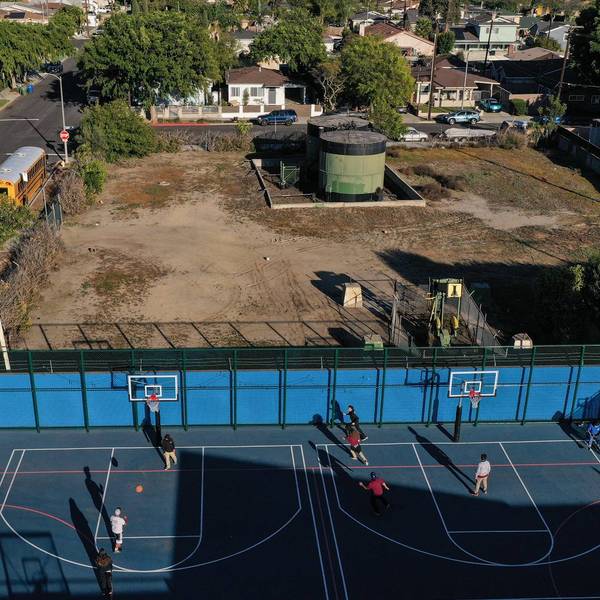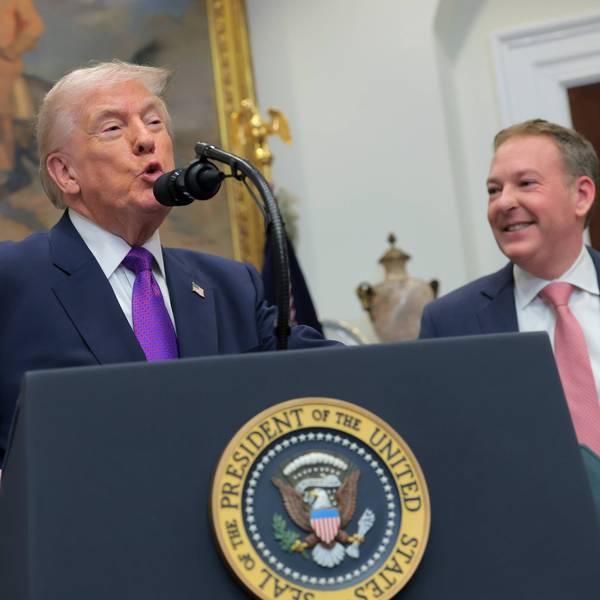Newsweek, Wash. Times Publish False Headlines About EPA Fracking Study
UPDATE (6/5/15): Following the publication of this post, The Washington Times changed its headline from "EPA: Fracking doesn't harm drinking water" to "EPA finds fracking poses no direct threat to drinking water." However, the New York Post published an article on June 5 adopting The Washington Times' original language, headlined, "Fracking doesn't harm drinking water: EPA."
ORIGINAL POST:
Within hours of the Environmental Protection Agency (EPA) releasing a study on hydraulic fracturing, or "fracking," Newsweek and The Washington Times published online articles with headlines that falsely claimed the EPA determined fracking does not pollute drinking water. However, while the EPA said it found no evidence that fracking has led to "widespread, systemic impacts on drinking water resources in the United States," the study also identified "specific instances" where fracking "led to impacts on drinking water resources, including contamination of drinking water wells."
In its headline, Newsweek asserted: "Fracking Doesn't Pollute Drinking Water, EPA Says." The Washington Times' similar headline, "EPA: Fracking doesn't harm drinking water," was also adopted by The Drudge Report, a highly influential conservative news aggregator.
But the EPA study said none of those things. Rather, the EPA concluded (emphasis added):
From our assessment, we conclude there are above and below ground mechanisms by which hydraulic fracturing activities have the potential to impact drinking water resources. These mechanisms include water withdrawals in times of, or in areas with, low water availability; spills of hydraulic fracturing fluids and produced water; fracturing directly into underground drinking water resources; below ground migration of liquids and gases; and inadequate treatment and discharge of wastewater.
We did not find evidence that these mechanisms have led to widespread, systemic impacts on drinking water resources in the United States. Of the potential mechanisms identified in this report, we found specific instances where one or more mechanisms led to impacts on drinking water resources, including contamination of drinking water wells. The number of identified cases, however, was small compared to the number of hydraulically fractured wells.
A more accurate headline about the EPA's study would have resembled that of U.S. News & World Report, which stated: "EPA: Fracking Tainted Drinking Water, but Problems Not Widespread."
Indeed, the EPA's determination that fracking has contaminated some drinking water wells was even included within the body of The Washington Times article. But a headline often shapes the way the rest of the article is perceived, and even reading the article may not be enough to correct for the headline's misinformation -- that is, if the reader gets past the headline, which most Americans do not.
In addition to mischaracterizing the EPA study, Newsweek and The Washington Times also excluded EPA's explanation of why its findings don't necessarily indicate "a rarity of effects on drinking water resources." The agency identified several "limiting factors" in its analysis, including insufficient data, the lack of long-term studies, and inaccessible information, stating that these limitations "preclude a determination of the frequency of [drinking water] impacts with any certainty." As the Environmental Defense Fund stated in a press release about the EPA study, "Better and more accessible data on activities surrounding hydraulic fracturing operations is needed."
An Urgent Message From Our Co-Founder
Dear Common Dreams reader, The U.S. is on a fast track to authoritarianism like nothing I've ever seen. Meanwhile, corporate news outlets are utterly capitulating to Trump, twisting their coverage to avoid drawing his ire while lining up to stuff cash in his pockets. That's why I believe that Common Dreams is doing the best and most consequential reporting that we've ever done. Our small but mighty team is a progressive reporting powerhouse, covering the news every day that the corporate media never will. Our mission has always been simple: To inform. To inspire. And to ignite change for the common good. Now here's the key piece that I want all our readers to understand: None of this would be possible without your financial support. That's not just some fundraising cliche. It's the absolute and literal truth. We don't accept corporate advertising and never will. We don't have a paywall because we don't think people should be blocked from critical news based on their ability to pay. Everything we do is funded by the donations of readers like you. Will you donate now to help power the nonprofit, independent reporting of Common Dreams? Thank you for being a vital member of our community. Together, we can keep independent journalism alive when it’s needed most. - Craig Brown, Co-founder |
UPDATE (6/5/15): Following the publication of this post, The Washington Times changed its headline from "EPA: Fracking doesn't harm drinking water" to "EPA finds fracking poses no direct threat to drinking water." However, the New York Post published an article on June 5 adopting The Washington Times' original language, headlined, "Fracking doesn't harm drinking water: EPA."
ORIGINAL POST:
Within hours of the Environmental Protection Agency (EPA) releasing a study on hydraulic fracturing, or "fracking," Newsweek and The Washington Times published online articles with headlines that falsely claimed the EPA determined fracking does not pollute drinking water. However, while the EPA said it found no evidence that fracking has led to "widespread, systemic impacts on drinking water resources in the United States," the study also identified "specific instances" where fracking "led to impacts on drinking water resources, including contamination of drinking water wells."
In its headline, Newsweek asserted: "Fracking Doesn't Pollute Drinking Water, EPA Says." The Washington Times' similar headline, "EPA: Fracking doesn't harm drinking water," was also adopted by The Drudge Report, a highly influential conservative news aggregator.
But the EPA study said none of those things. Rather, the EPA concluded (emphasis added):
From our assessment, we conclude there are above and below ground mechanisms by which hydraulic fracturing activities have the potential to impact drinking water resources. These mechanisms include water withdrawals in times of, or in areas with, low water availability; spills of hydraulic fracturing fluids and produced water; fracturing directly into underground drinking water resources; below ground migration of liquids and gases; and inadequate treatment and discharge of wastewater.
We did not find evidence that these mechanisms have led to widespread, systemic impacts on drinking water resources in the United States. Of the potential mechanisms identified in this report, we found specific instances where one or more mechanisms led to impacts on drinking water resources, including contamination of drinking water wells. The number of identified cases, however, was small compared to the number of hydraulically fractured wells.
A more accurate headline about the EPA's study would have resembled that of U.S. News & World Report, which stated: "EPA: Fracking Tainted Drinking Water, but Problems Not Widespread."
Indeed, the EPA's determination that fracking has contaminated some drinking water wells was even included within the body of The Washington Times article. But a headline often shapes the way the rest of the article is perceived, and even reading the article may not be enough to correct for the headline's misinformation -- that is, if the reader gets past the headline, which most Americans do not.
In addition to mischaracterizing the EPA study, Newsweek and The Washington Times also excluded EPA's explanation of why its findings don't necessarily indicate "a rarity of effects on drinking water resources." The agency identified several "limiting factors" in its analysis, including insufficient data, the lack of long-term studies, and inaccessible information, stating that these limitations "preclude a determination of the frequency of [drinking water] impacts with any certainty." As the Environmental Defense Fund stated in a press release about the EPA study, "Better and more accessible data on activities surrounding hydraulic fracturing operations is needed."
UPDATE (6/5/15): Following the publication of this post, The Washington Times changed its headline from "EPA: Fracking doesn't harm drinking water" to "EPA finds fracking poses no direct threat to drinking water." However, the New York Post published an article on June 5 adopting The Washington Times' original language, headlined, "Fracking doesn't harm drinking water: EPA."
ORIGINAL POST:
Within hours of the Environmental Protection Agency (EPA) releasing a study on hydraulic fracturing, or "fracking," Newsweek and The Washington Times published online articles with headlines that falsely claimed the EPA determined fracking does not pollute drinking water. However, while the EPA said it found no evidence that fracking has led to "widespread, systemic impacts on drinking water resources in the United States," the study also identified "specific instances" where fracking "led to impacts on drinking water resources, including contamination of drinking water wells."
In its headline, Newsweek asserted: "Fracking Doesn't Pollute Drinking Water, EPA Says." The Washington Times' similar headline, "EPA: Fracking doesn't harm drinking water," was also adopted by The Drudge Report, a highly influential conservative news aggregator.
But the EPA study said none of those things. Rather, the EPA concluded (emphasis added):
From our assessment, we conclude there are above and below ground mechanisms by which hydraulic fracturing activities have the potential to impact drinking water resources. These mechanisms include water withdrawals in times of, or in areas with, low water availability; spills of hydraulic fracturing fluids and produced water; fracturing directly into underground drinking water resources; below ground migration of liquids and gases; and inadequate treatment and discharge of wastewater.
We did not find evidence that these mechanisms have led to widespread, systemic impacts on drinking water resources in the United States. Of the potential mechanisms identified in this report, we found specific instances where one or more mechanisms led to impacts on drinking water resources, including contamination of drinking water wells. The number of identified cases, however, was small compared to the number of hydraulically fractured wells.
A more accurate headline about the EPA's study would have resembled that of U.S. News & World Report, which stated: "EPA: Fracking Tainted Drinking Water, but Problems Not Widespread."
Indeed, the EPA's determination that fracking has contaminated some drinking water wells was even included within the body of The Washington Times article. But a headline often shapes the way the rest of the article is perceived, and even reading the article may not be enough to correct for the headline's misinformation -- that is, if the reader gets past the headline, which most Americans do not.
In addition to mischaracterizing the EPA study, Newsweek and The Washington Times also excluded EPA's explanation of why its findings don't necessarily indicate "a rarity of effects on drinking water resources." The agency identified several "limiting factors" in its analysis, including insufficient data, the lack of long-term studies, and inaccessible information, stating that these limitations "preclude a determination of the frequency of [drinking water] impacts with any certainty." As the Environmental Defense Fund stated in a press release about the EPA study, "Better and more accessible data on activities surrounding hydraulic fracturing operations is needed."

